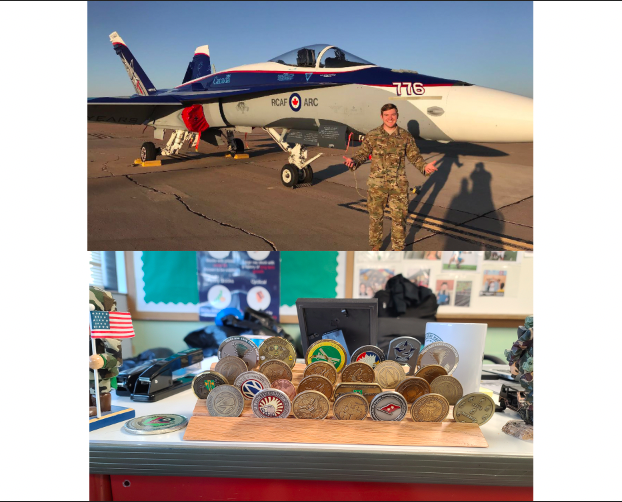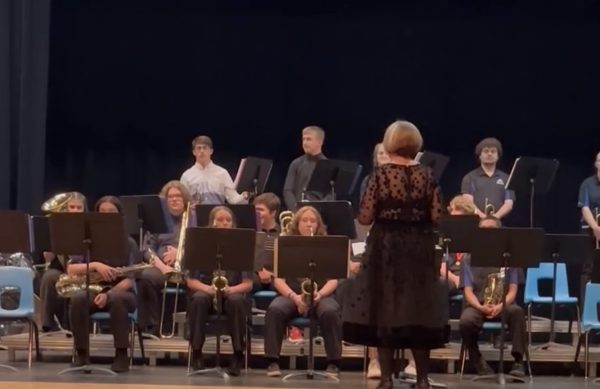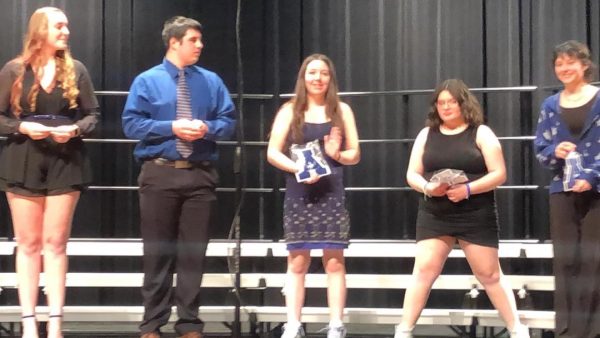Veteran’s Point of View
Mr. Hasz served in the United States Army. While in the Army, Mr. Hasz was part of the military police and the reserve. Which meant he was within a group of soldiers who are called to fill in for the active duty components in wars or any type of mission. Mr. Hasz joined the army on March 28, 1990. When he first joined he was a supply person; part of the police unit. In 1990 he got back from South Carolina. Four months later he was sent to Desert Storm. He spent six months in the middle east in Saudi Arabia and worked with EPW prisoners of war, there were 15 thousand prisoners. While Mr. Hasz was there he was doing Military Police work and made sure that they had all of the supplies and food needed for the amount of people there. When he came back home he became a teacher while also working for the army. He would work for the army during the day and work on getting his teaching certificate at night. He started teaching in 1993 and stayed in the army reserve. Mr. Hasz was promoted to Sergeant in 1992, staff Sergeant in 1996, Sergeant First Class in 1999, and was promoted to Second Lieutenant in 2002 and would later retire as Captain. While he was in the Army reserve he got deployed to Kosovo as a prison guard. When he was Sergeant First Class he was deployed to a terrorist camp, then to Iraq as a transportation officer.
Mr. Hasz is from Omaha Nebraska but he grew up in South Dakota. The people he served with were from the Eastern part of Nebraska. When he lived in that area he would take Veterans Day off to spend time with his army buddies. This was not done this year, due to living too far from them. Although he no longer lives near his army buddies he still has a camaraderie with all vets. Mr. Hasz thinks that it is important to celebrate with all veterans because it is a big emotional day for all of them. This is because they think about their time in the military with the events they witnessed and they think about their comrades that did not make it home. Revelry is played as the flag rose and is taken down.
Mr. Hasz says that Alliance is the most patriotic town he has taught in. He is also part of the VFW, for veterans that have served in a war, and the American Legion, for veterans that were in the military up to any capacity.
From Mr. Hasz’s point of view as a veteran, it is hard when there are things that he can’t talk to his family about, but can talk to other vets about. This can be due to military clearance or just the fact that they have all served and have shared experiences. Some of which civilians would not understand. When it comes to future military personnel Mr. Hasz says to put in 20 years for the benefits or take advantage of the earned benefits. He also wants them to be safe and always think things through.
Mr. Sherlock was a part of the Marine Corps. His basic training was mainly day-to-day. “The first 13 weeks is like your typical boot camp style where 3 really mean guys yell at you for 13 weeks to whip you into shape, and basically take you from civilian life to Marine standards.” After that, the trainees go to Marine Combat Training, MCT, for 35 days where basic rifleman skills are taught for combat. This is where they learn how to hold and shoot rifles properly in a combat setting. At times they also shoot grenade launchers and throw grenades in order to get familiar with the marine weapons systems. After that Mr. Sherlock went to MOS specialty schools, a Military occupation school, where they would decide the type of schooling they want.
Mr. Sherlock was a field radio operator so he went to a course in that particular field. He was in school for 2 months. During the course he was taught everything there is to know about all of the communication systems the United States military utilized. November 10 is the marine corps’ birthday so they joke with all of the other branches.
Mr. Sherlock views himself to be too young to be a veteran. He went through 2 tours for operation inherent resolve after operation enduring freedom, there they would give out medals and campaign ribbons. Generals also try to refocus war efforts, clearing houses or during peacetime where they train the locals to defend themselves. The inherent resolve is to support locals in places such as Iraq, Iran, and Syria. He did that on both deployments with his first being in 2015 to 2016 in Iraq and his second deployment being from 2017 to 2018.
Mr. Sherlock has observed the patriotism in the community by watching the students respect the veterans and their interest in entering the military. In general Mr. Sherlock’s view about veterans is that some vets really rally behind Veterans Day and it becomes a part of their identities; while others shy away. He believes that the true vets came before him and does not view himself as one but with time his opinion may change. When it comes to the kids that plan to enter the military he views it as a good option if they don’t know what they want to do right after graduation. The military gives a clean slate so you have the opportunity to decide on a career path so you can find a job that interests you and you have the chance to meet really cool people while also getting the opportunity to go to college. The best kind of training you can do before enlisting in the military is to train yourself mentally and physically and to do some growing up before entering.
Tanner Blomenkamp was a part of the United States Airforce. He was in college learning how to paint cars when he visited his friend’s Airforce base. He thought that the base was really cool and when he got back he talked to a recruiter to take an aptitude test to see what he was qualified for. He left for camp on November 17, 2012, for basic training. His training was at Lockland Air force base in San Antonio, Texas. The training was supposed to last for about eight to eight and a half weeks but it lasted about nine for him. The reason that Tanner’s training lasted longer was because he went to training right before Thanksgiving and the processing staff was not there during the break. When Tanner got there he described it as a ghost town. As he got settled he was given boxed lunches, which are a very big thing in the military.
When he first got to the base he got processed and then they took him to his barracks. After entering the barracks Tanner got to find out the squadron he would belong to the 322nd training squadron. He was in the “Screaming Eagles second to none come get some.” From there they pretty much started yelling and screaming at him. They would use all kinds of language to scream at him and none of the language was kind and it took Tanner a little bit of time to get adjusted to it. When it came to the training itself it was not super difficult because everyone was going through the same thing together.
“It was so fast it was kind of a blur. You’re in a whole different world. It was definitely surreal.” About halfway through training, Tanner could not believe that he was actually doing it. He did not even come from a big military family. He did not know why he did it in the first place but he enjoyed working in the military. He got stronger and liked what he did in uniform.
The first base Tanner went to was Anderson Air Force base in Guam, a U.S. territory by Japan. While there he was assigned to the 36 operation support squadron and was there from April 2013 to April 2015. He then went to special operations in Cannon Airforce base Clovis New Mexico where he was assigned to the 27th special operations support squadron. He served there till 2018. Once he departed he served another 3 years in the Wyoming air national guard in Cheyenne.
When Tanner was in Guam, stationed there for 2 years, he was with the 36th operation support squadron. Tanner was with the airfield management operation. His job mostly consisted of coordinating and doing airfield inspections. His squadron would inspect the pavement, pavement markings, lighting and filing flight plans. His favorite part of the whole thing was interacting with pilots, filing flight plans, maintaining a safe operating area and responding to ground and in-flight emergencies. He would drive down the runway to make sure that the plane landed okay and everything.
When Tanner first entered Guam he had no service on his phone so he could not call his parents and let them know he was there. While he was in Guam there was a Burger King with wifi right across the street from his dorm. This meant he could finally talk to his parents. “I probably hung out in that Burger King for like the first month.“ Although Tanner hates Burger King he was able to reconnect to the world from there.
Tanner feels that those were the sorts of situations that built resiliency and when he learned how to handle stress without becoming overwhelmed and breaking down.
In the total of nine years Tanner was in the military he spent six of the years in active duty and the last three in guard. While Tanner was in guard duty he was also managing a Runza. It became hard for him to balance being both the boss at Runza and a guard. This was difficult because he would have to switch between jobs every month. After so long he knew he had to make a choice between the two. With Runza being his future he left the military and Runza became his full-time job. By the time Tanner left the Airforce he was Staff Sergeant Blomenkamp.
When it comes to the patriotism in this town Tanner believes that a lot of veterans came to Alliance to be able to get hired at the railroad. There were even apartments built for the WWII vets that were going to come home.
For the people who plan on entering the military just make educated decisions and know what you plan on doing in the military.
Make sure you know what you are getting yourself into. It may be a way different world, but it can also be very rewarding. There are a lot of outlets to learn about the military that aren’t just the recruiters. It is best to do your own research on the job you want and learn what it is like before you go into it. The military can open your eyes up to a different world. There are a lot of good benefits available to take advantage of.

Hello to all! My name is Trinity Quick and I am the daughter of Carl Quick. I have a blended family which gave me an extra mom and dad and an older brother...











